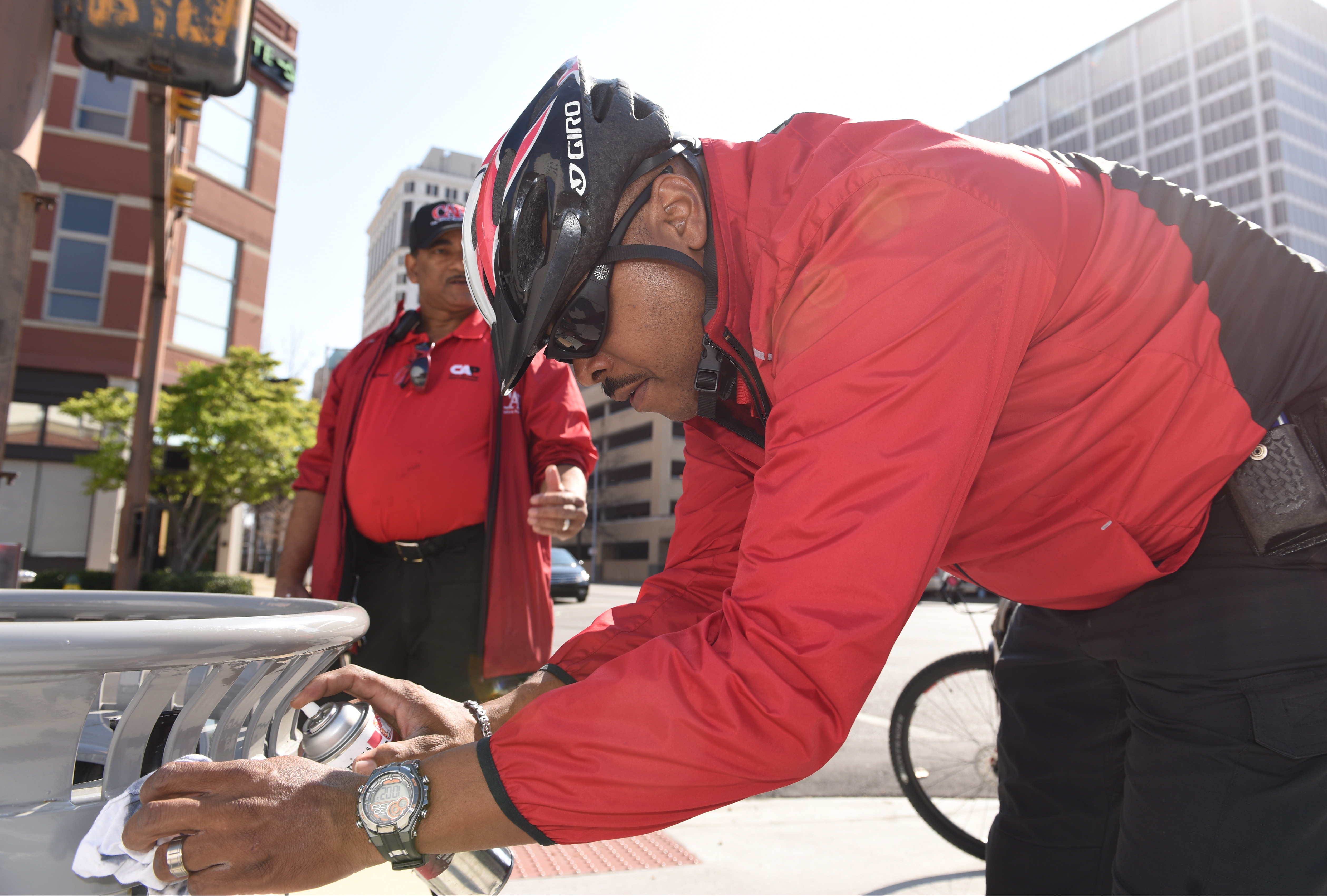
By Ariel Worthy
The Birmingham Times
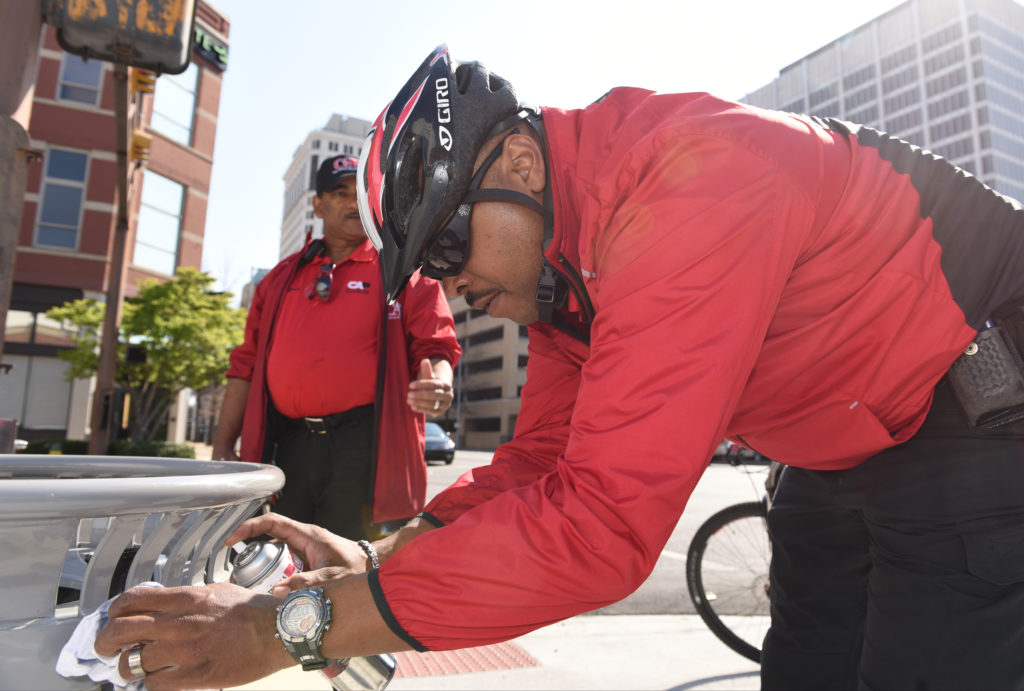
Stacy Justice was visiting Children’s of Alabama in downtown Birmingham when she faced a challenge.
Justice’s mother-in-law had been at the hospital with a foster baby that had undergone surgery. As Justice was pulling her car around to pick up her family, her car battery died. That’s when she called the City Action Partnership, known as CAP.
“They got there and jump-started the car before [my family] was even out of the hospital …,” Justice said. “[My mother-in-law] was exhausted and had been up all night with a sick baby, so to have a free service like that was huge.”
Jimmy Swindle, CAP’s day-shift supervisor, said the goal is to get to a job in less than four minutes: “Most of the time it will fall within two minutes.”
CAP, created by downtown Birmingham property owners, is a nonprofit business improvement district set up by legislative act in 1995 and has become a Birmingham success story.
The service responds to thousands of calls for assistance every year, and its officers perform myriad services, including jump-starting and unlocking vehicles, fixing flat tires, and even providing a gallon of gas when a car is completely on empty. CAP officers also help keep the city clean by picking up litter and cleaning graffiti.
Many who visit downtown Birmingham have CAP to thank for getting them out of jams.
Justice, who is from the Muscle Shoals area, said her family didn’t know anyone in Birmingham, which made them appreciate the service even more.
“[We] had nobody locally that we could call and ask, ‘Hey, can you give us a hand?’ she said. “[CAP] knew where to find us and [arrived] within a few minutes to help us get … on our way quickly. Being able to have that and not stress over it was a huge relief.”
CAP works in partnership with the city of Birmingham and the Birmingham Police Department (BPD), as well as residents, businesses, and organizations, including United Way of Central Alabama, REV Birmingham, the American Red Cross Mid-Alabama Chapter, the Downtown YMCA, and Firehouse Ministries.
In addition, downtown property owners pay a percentage of their property value annually to fund CAP, which helps fill gaps where city services come up short. The partnerships and funding have helped reduce crime by 70 percent in downtown Birmingham, making it one of the safest areas of the metro region.
Glen Robinson, interim director at CAP, said “the success of CAP has to do with our partnership with different organizations. Working with the police… they can’t be there all the time and there are other things going on that they need to do and if we can do small stuff, they can do the heavy stuff. It all works – all of our partnerships – because we can all do our parts.”
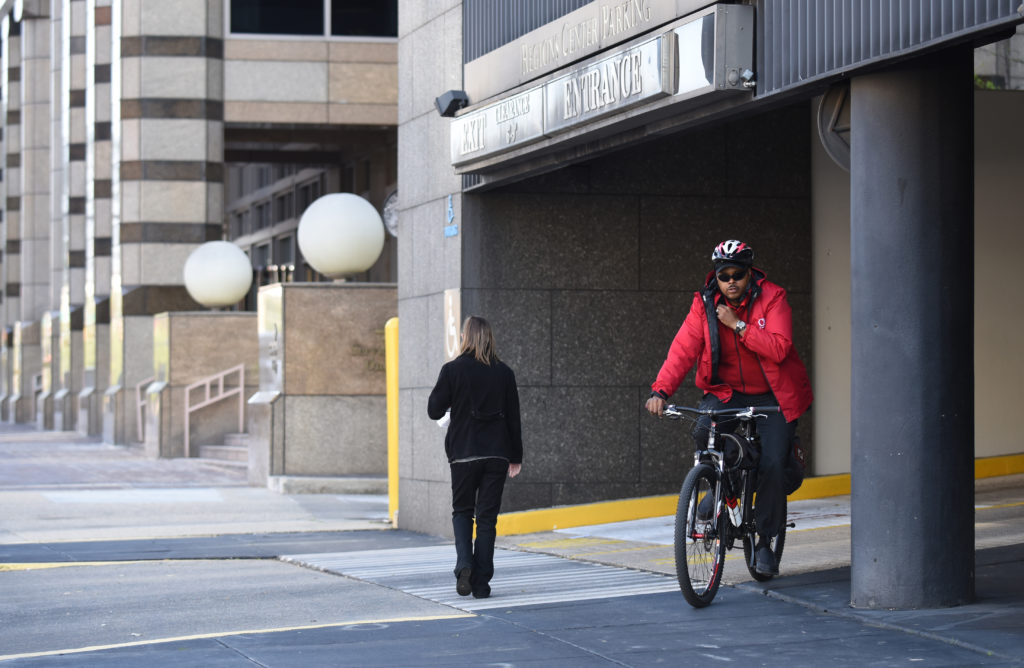
Early Start
A day at the CAP office begins at 7 a.m., with the staff brewing a pot of coffee and planning who will take which routes for the day.
Officers are hired through Security Engineers Inc., a Birmingham-based security firm. Those hired typically must have some college education, be a veteran, or serve in the military, said CAP Communications Manager Douglas Stewart.
“Of the 15 officers working with CAP, 12 are veterans,” he said.
After receiving their daily assignments, officers wait for calls and patrol the downtown, Railroad Park, Children’s of Alabama, and Southside areas via two forms of transportation: trucks and bicycles.
CAP has four trucks and 15 bikes. The bicycle units assist with car jump-starts and unlocks; they also monitor and help with panhandlers. The units are fully staffed, and each officer is trained in cardiopulmonary resuscitation (CPR), first aid, and automated external defibrillator (AED) use.
“Usually, [a job is done] within a couple of minutes, unless it’s during one of our rush hours,” Swindle said.
The CAP District covers a 90-block area that is bounded to the north by 11th Avenue North, which includes the Birmingham-Jefferson Convention Complex (BJCC), to the south by Fifth Avenue South, to the east by 22 Street, and to the west by 16th Street North and 18th Street South. Its hours of operation are from 7 a.m. to midnight, with the busiest shifts being 7 a.m. to 9 a.m., 11 a.m. to 1 p.m., and 4 p.m. to 6 p.m.
“At night, our calls come in twos and threes,” Swindle said. “Usually, it’s really busy when the [Alabama and Lyric] theaters and the BJCC all have something going on. [There are] multiple calls because it seems like all the events end at the same time. That’s when everybody comes out to their cars and realizes they locked their keys in or their cars won’t start.”
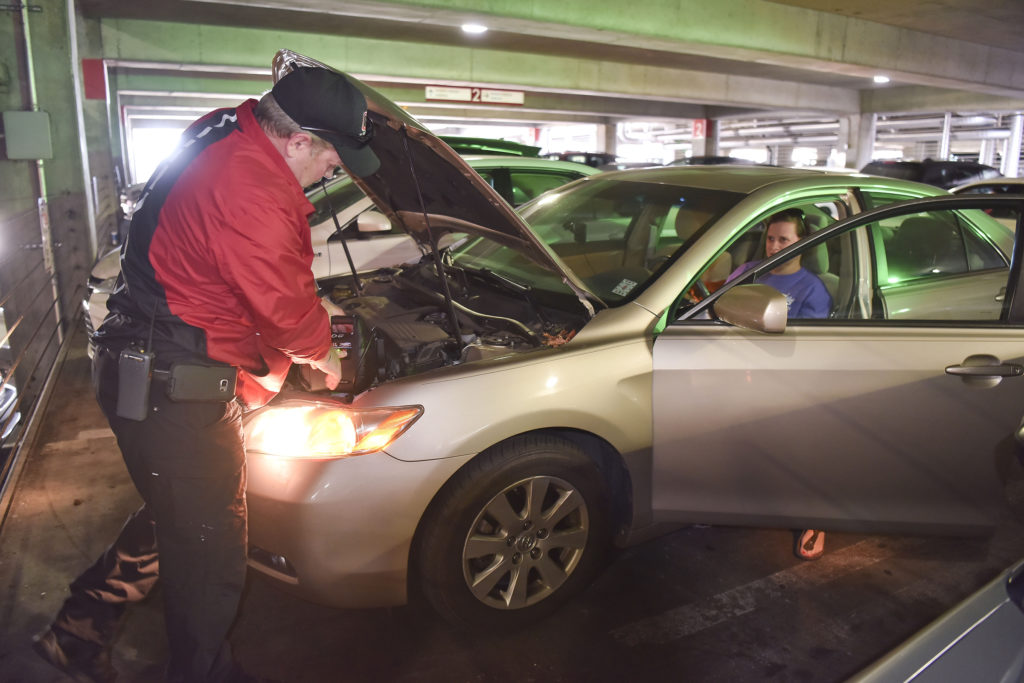
Drawing a Line
CAP noticed a pattern, especially at the BJCC, Swindle said.
“Everyone seems to know about us,” he said. “So, instead of taking their keys with them, they just lock them in the car and call us when they come out. It keeps them from losing their keys. I caught on to it and asked a guy, ‘Where are your keys?’ He said, ‘They’re under the mat.’ He said he put them there [because] he didn’t want to lose them in the BJCC.”
CAP officers draw a line in some cases.
“If we get to a car and smell alcohol, we do not unlock the car,” Swindle said. “If someone starts arguing, … my officers say: ‘I’ve got a solution to this. Let me get the police. If they say you’re OK to drive, I will unlock your car.’ Usually, the response is, ‘Hey, man. It’s good.’ They’d rather just come back later for the car.”
Meeting the Public
Having CAP in Birmingham during the downtown revitalization with a growing number of lofts, businesses and entertainment venues is of “huge importance” said Robinson.
“All of these people . . . count on CAP, and the fact that we’re here is a big selling point; they want us in their district,” he said.
In addition to assisting motorists in need and keeping downtown safe, CAP officers also work with the city’s homeless.
“One day, [an officer may need to] wake someone who is sleeping in front of a building” and the person becomes disorderly. “The next day, that same person will talk to the officer like they’re best friends,” Swindle said. “No one holds a grudge. We realize that some of these individuals may be [dealing with difficult situations].”
If someone becomes unruly, Swindle said, “we talk to them and just calm them down. They usually just need somebody to relate to them.”
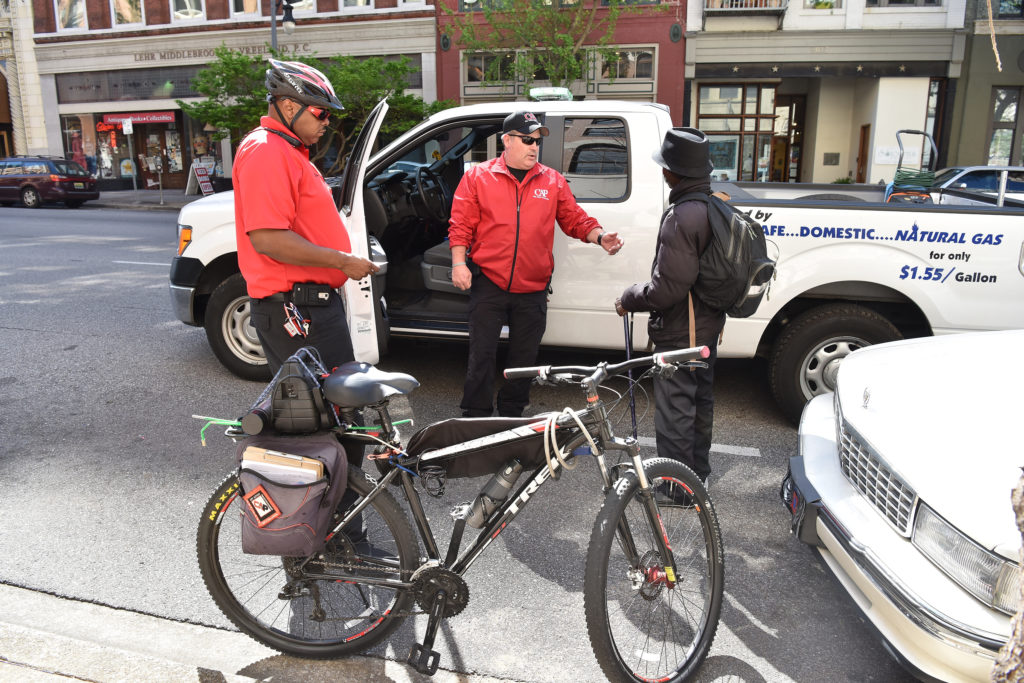
Community Service
It’s not unusual for CAP to have court-ordered service workers, people who have been charged with driving under the influence (DUI) and other minor offenses, work off some of their sentenced time, tickets, or fines with them. Those workers spend their time removing graffiti and picking up trash around designated CAP areas.
“We try not to keep more than five service workers,” Stewart said. “If we get a difficult person, the judge will tell us to send them back. Most of the time, however, people are happy to not have to pay a fine.”
Bigger Mission
When major catastrophes occur, CAP can be called on to assist with emergency relief efforts. For instance, with Hurricane Katrina in 2005, CAP became a collection point for supplies and donations for those in need. The group received so much that “it was overwhelming,” said CAP Office Manager Laura Parenteau. “We had to get the stuff out of the office.”
After two days, Parenteau found a warehouse to store collections.
“We had all kinds of volunteers, and we started shipping stuff,” she said. “While we were collecting regular supplies, the [Alabama Office of the American Diabetes Association] called and made an offer to send [supplies for diabetes patients.] They had a big donation that no one would take, so they … asked if we would take it.”
CAP received a month’s worth of diabetic testing and treatment kits, Parenteau said: “We went down to the Gulf [region] and just started distributing them to clinics and people. I did it for four years.”
The organization also collected baby food and formula for those affected by Hurricane Katrina.
“They were being donated to Jessie’s House, but it was way too much, so they started donating to us,” Parenteau said. “We shipped pallets of baby formula down to New Orleans.”
CAP is all about community and serving people, she said.
“We started out serving our downtown area by helping the [local] Red Cross, and we just expanded,” Parenteau said. “You never know what’s going to happen around here.”
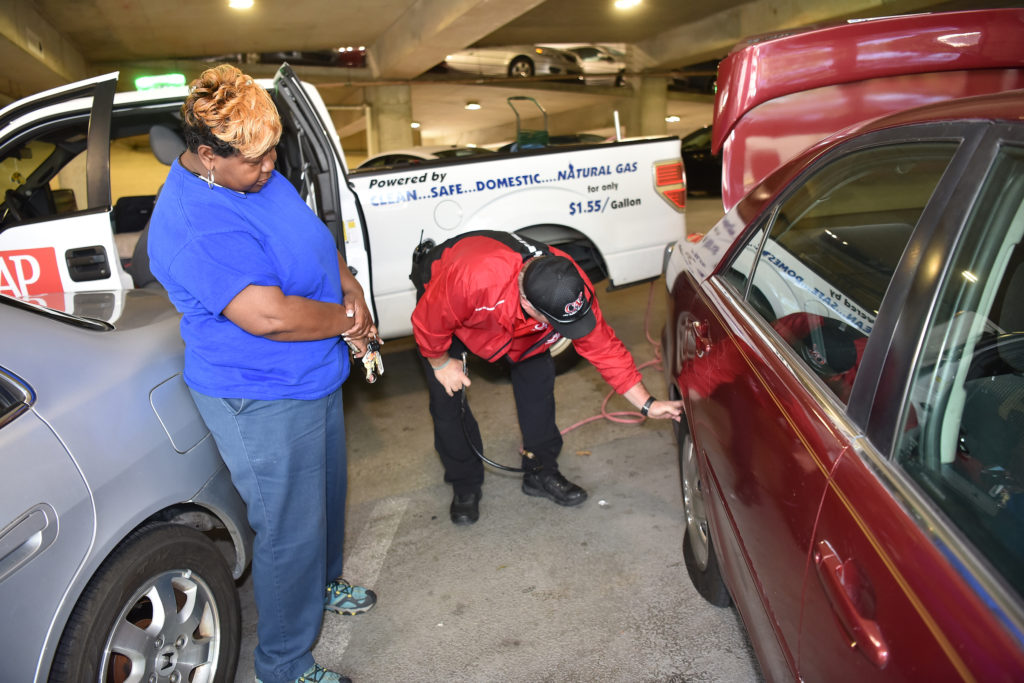
‘Helping Our Own’
When emergencies happen, CAP is there. Ask Jackie Thomas.
“It’s a good service, they came right on when I called them,” said Thomas, who called CAP recently, when she had a flat tire on Richard Arrington Boulevard. “It would have been a big headache … to find somebody to change the flat for me and then try to get me [where I had to go].”
CAP replaced her flat tire with a spare. Having a free service is invaluable, she said.
“When you’re stranded, you don’t want to wait long, and they came [quickly],” Thomas said. “It shows that we want to help our own.”




